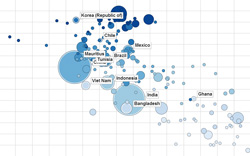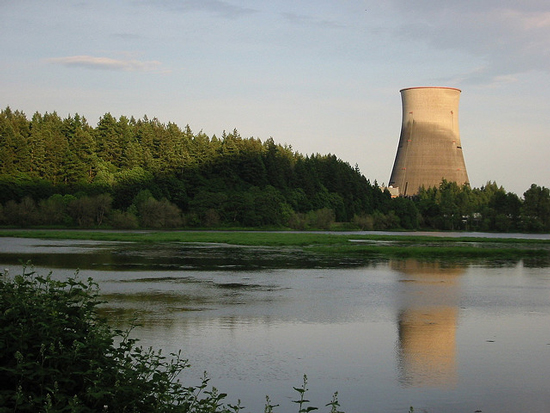-
8 Takeaways From the Paris Climate Change Conference
›The nations of the world may have finally solved the thorniest problem in international relations and now we need to figure out practical solutions, said a panel of experts at the Wilson Center on December 16.
-
The Year That Resilience Gets Real
›2014 promises to be a superlative year – and that’s not necessarily a good thing. Complex, “super” disasters like Super Typhoon Haiyan are becoming more frequent, more systemic, and more destructive. Global trends, from population dynamics to food, water, and energy scarcities, threaten to further complicate the playing field. But by finally getting serious about resilience – the much discussed buzzword of 2013 – we might reduce our vulnerability, restore our communities, and build back better, rather than just picking up the pieces.
-
Demographic Dividend and the Rise of the Global South
›
The Global South is “radically reshaping the world of the 21st century, with developing nations driving economic growth, lifting hundreds of millions of people from poverty, and propelling billions more into a new global middle class,” says the United Nations Development Program’s (UNDP) 2013 Human Development Report, released yesterday. “More than 40 developing countries have made greater human development gains in recent decades than would have been predicted.”
-
Seven Ways Seven Billion People Affect the Environment and Security (Policy Brief)
›The Wilson Center Policy Briefs are a series of short analyses of critical global issues facing the next administration that will run until inauguration day.
Seven billion people now live on Earth, only a dozen years after the global population hit six billion. But this milestone is not about sheer numbers. Demographic trends will significantly affect the planet’s resources and people’s security.
-
UN Security Council Debates Climate Change
› Today the UN Security Council is debating climate change and its links to peace and international security. In this short video, ECSP Director Geoff Dabelko outlines his hopes for today’s session and its follow-on activities. He suggests it is time to move from problem identification to problem solving by developing practical steps to respond to climate-security links.
Today the UN Security Council is debating climate change and its links to peace and international security. In this short video, ECSP Director Geoff Dabelko outlines his hopes for today’s session and its follow-on activities. He suggests it is time to move from problem identification to problem solving by developing practical steps to respond to climate-security links.
This Security Council debate was held at the instigation of the German government, chair of the Security Council this month. But it is not the first time this body has debated climate and security. In 2007, the United Kingdom used its prerogative as chair to introduce the topic in the security forum. Opinions from member states diverged on whether the Security Council was the appropriate venue for climate change.
Largely at the instigation of the Alliance of Small Island States, the UN General Assembly tackled climate and security links in 2009. The resulting resolution also spurred the UN Secretary-General to produce a summary report on the range of climate and security links.
Sources: Reuters, UN. -
What’s the Link Between Population and Nuclear Energy?
›The popular Big Green Purse blog, written by best-selling author Diane MacEachern, recently asked the Worldwatch Institute’s Robert Engelman, “What’s the Link between Population and Nuclear Energy?” The blog, which encourages women to use the “power of the purse” to improve the environment, wanted to know: “Why aren’t we talking about reducing population as part of our global strategy to minimize dependence on power sources [like nuclear energy] that pollute the environment and threaten people’s health?”
While “reducing population” is not possible, slowing population growth may be, if fertility rates continue to fall. As always, Engelman answered the tough question with thoughtful aplomb, offering three core values as a starting point:One: see the global environmental dilemma not as a problem to be solved but as a predicament to be responded to. We can’t control our future, but we can act with integrity as we aspire to build just societies in an environmentally-sound world. Addressing our numbers can become part of that.
But I’m wondering how the readers of Big Green Purse – which is replete with media-friendly lists like “Top Ten Eco-Tricks” – can translate population and its messy intersection of human rights, health care, and consumption levels into an individual purchasing decision.
Two, embrace human rights as a foundation for our actions. All people – even if too many or consuming too much – have dignity and a right to be here. As it happens, population policies based on the right of all women to choose whether and when to bear a child actually slow the growth of population. …
Three, acknowledge that no one can claim a greater right than anyone else to use energy and natural resources. This is called equity. We cannot object if the poorest people living today and yet to be born succeed in gaining the means to consume as much as Americans do.
As Engelman writes, “The idea that we can easily trim our individual consumption to come into balance with nature – worthy as that effort is – looks increasingly naïve. If people in the developed world slash their per capita greenhouse emissions by half, their effort could be counterbalanced by people in developing countries boosting theirs by just 11 percent.”
Photo Credit: “Trojan Nuclear Power Plant,” courtesy of flickr user tobo. -
Brian O’Neill: Population is Neither a Silver Bullet nor a Red Herring in Climate Problem
›October 16, 2010 // By Meaghan Parker“Slower population growth would not solve the climate problem, but it could make a contribution. It is neither a silver bullet nor a red herring,” said Brian O’Neill of the National Center for Atmospheric Research at the annual Society of Environmental Journalists’ conference in Missoula, MT. On Friday, he presented the results of a new demographic study as part of a panel, “Population, Climate, and Consumption,” moderated by Ken Weiss of the Los Angeles Times.
-
‘Dialogue Television’ Explores Pakistan’s Population Challenge
›It’s difficult to imagine a scenario for a stable and peaceful world that doesn’t involve a stable and peaceful Pakistan. The country is among the world’s most populous and is also home to the world’s second largest Muslim population, making it the only Muslim majority nuclear state. Its history has been characterized by periods of military rule, political instability, and regional conflicts. This week on dialogue host John Milewski explores the nation’s changing demographics and what they may tell us about near and long term prospects for this vital U.S. ally with guests Michael Kugelman, Zeba Sathar, and Mehtab Karim.
Watch above or on MHz Worldview.
Michael Kugelman is program associate with the Wilson Center’s Asia Program. Much of his recent research and programming focus has involved demographics in Pakistan. He is a regular contributor to Dawn, one of Pakistan’s major English language newspapers.
Zeba Sathar is Pakistan country director at the Population Council in Islamabad. Prior to joining the council, she was chief of research in demography at the Pakistan Institute of Development Economics and a consultant with the World Bank.
Mehtab Karim is a distinguished senior fellow and affiliated professor with the School of Public Policy at George Mason University. Additionally, he is a senior research fellow at the Pew Research Center’s Forum on Religion and Public Life, specializing in global Muslim demographics. Previously, he was a professor of demography at Aga Khan University in Karachi.
Note: A QuickTime plug-in may be required to launch the video.
Showing posts by Meaghan Parker.







